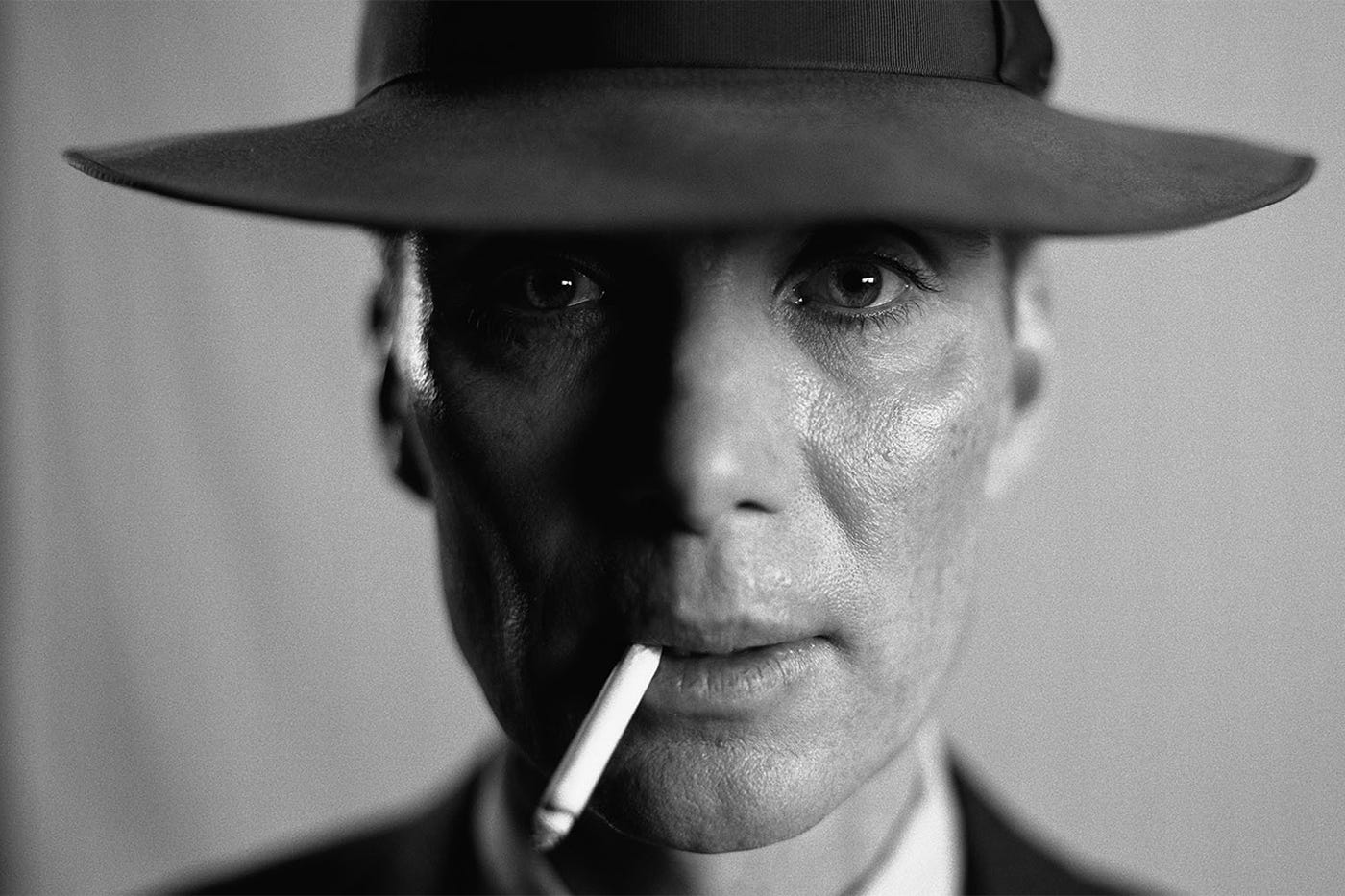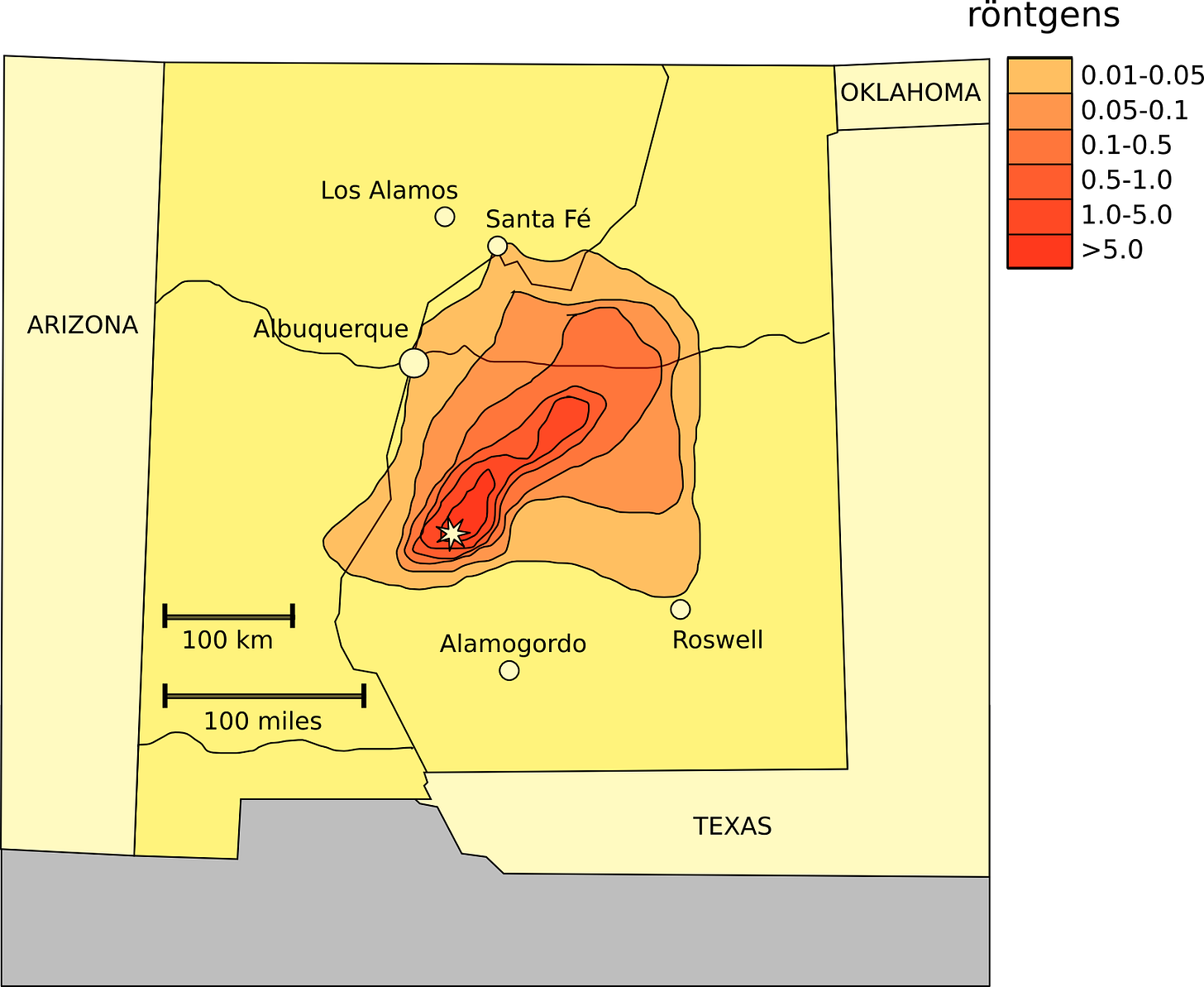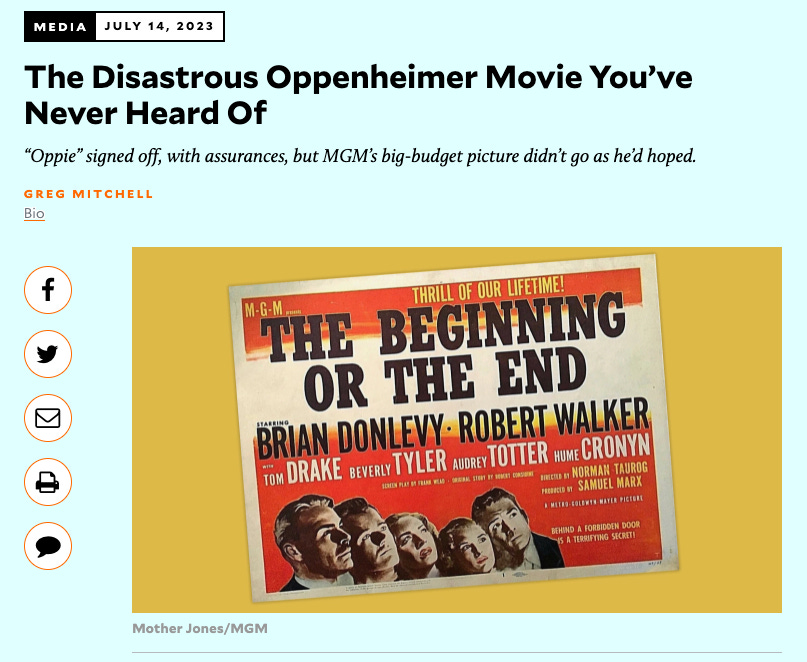UPDATE, Sat. night: Just home after the 2 p.m. Oppenheimer screening (then panel and reception) in a modern basement theater seating 120 in a hotel not far from Central Park. When we arrived we saw about 15 activists outside the hotel, some with signs, and I presumed it had to do with the actors/writers strike but, no, it was an antinuclear group handing out flyers noting that tomorrow marks the Trinity test anniversary. They are rightly highlighting the ongoing human toll of nuclear weapons production, testing, and use, and to encourage full justice and compensation for all downwinders.
I will try to gather my thoughts, no easy task for this film, and offer a number of comments tomorrow morning. There is a lot to unpack. As the few who have seen the movie have noted, it is indeed brilliantly directed and acted, and Nolan script, with especially fine sound design and soundtrack. Like some earlier Nolan movies, it flashes back and forward and sideways in time, but it is unusually linear for him, and the shift from color to B&W helps. Powerful ending. Handles well his “fellow traveling” in the 1930s and fateful meeting with pal Chevalier.
Can’t say I loved Gary Oldman chewing the scenery as Truman. The two key women in his life needed more fleshing out, although Emily Blunt as Kitty Oppenheimer does gain depth and importance by the end. Former Atomic Energy Commission chief Lewis Strauss may be wonderfully portrayed by Robert Downey, and is a perfect movie character, but he takes up too much screen time and oxygen.
As for overall content and emphasis and what’s missing: more tomorrow!
For now, the post-screening panel featured Nolan, my friend and co-author of source book Kai Bird, and three scientists, moderated by Chuck Todd, who joked (?) there was more brain power on stage than any Meet the Press gathering. For sure. Two of the scientists were described as “mentors” to Nolan on physics. Here is a link to coverage of Nolan’s remarks there about the new AI threat, with some saying that tech inventors and some Silicon Valleyites are facing their own “Oppenheimer moment.” Nolan said they must be kept “accountable…. AI systems will go into defense infrastructure ultimately—they’ll be in charge of nuclear weapons.” He added that he hoped his film offered “lessons” for them based on Oppenheimer’s experiences (and downfall).
Nolan was also eloquent on modern nuclear dangers after Todd asked him if he’d like to see the movie “streamed to Congress.” Nolan said that recognition of nuclear peril too often “ebbs” while “the threat is constant. Nuclear weapons are extremely dangerous things to have lying around house.” He feels especially alarmed with references to smaller “tactical” nukes, as if there is an acceptable size for possible use.
Check back here tomorrow and days ahead for more, or subscribe now, it is free! And for much more on Oppie—and the FIRST atomic bomb movie—see my book The Beginning or the End. Also note: Every year at this time I post a daily 'Countdown to Hiroshima,' going back to what happened on this date in 1945. Today: the fateful first test at Trinity (and the cover-ups begin):
This morning:
Early posting today as we are heading to NYC this morning for one of th first preview screenings of the Nolan movie, plus the director (and friend Kai Bird) on a panel.
Obviously, I will weigh in here Sunday and Monday. Some of you know my concerns, going back to my first Substack post last December. Now it’s time to watch with clear and open eyes and hope for the best.
_____
Tomorrow is the 78th anniversary of the first atomic test at Trinity. Oppie famously bet ten dollars against George Kistiakowsky's entire month's pay that the bomb would not work at all.
Will the Nolan movie (which spotlights the test) include much if anything on the radioactive cloud that drifted from the site and endangered humans (who were not warned) and animals? Well, here is a map, if not. Exposure levels, of course, were kept secret from the press and public. Oppenheimer agreed with that.
From an official report:
In New Mexico, radiation landed on vegetables and cattle and contaminated the water supply. Many people in rural New Mexico lacked running water and collected rainwater that ran off of roofs in large cisterns, or holding tanks. Most locals also grew most of their own food and raised livestock for meat. Eating foods with high levels of radiation has been linked to cancer, stillbirth, and birth defects.
_____
Some drama now around the planned gala premiere of the movie in NYC on Monday, and party under the great whale at the Natural History Museum. No actors. The red carpet: already canceled. What will they do?
_____
Lot of social media attention for my Mother Jones piece yesterday, thank you, so here is the link again. Several more pieces, with Oppenheimer, coming from me next week, including LitHub on Monday, derived from my The Beginning or the End book.
_____
Cillian Murphy this week: "I did read the Bhagavad Gita in preparation for the film. I thought it was an absolutely beautiful text. Very inspiring."
_____
No, Oppenheimer has not been “banned by Japan.” Viral social media meme but that’s all. No distribution set up there yet but explanations range from “waiting to see how it does globally” to “Nolan is sensitive to feelings there and doesn’t want to push too strongly right now.”
Song of the Day
Surely the only song about the Hiroshima bombing and its victim from a top group, it came from one of my faves, the Byrds, back in 1966, and it’s still little known today.






